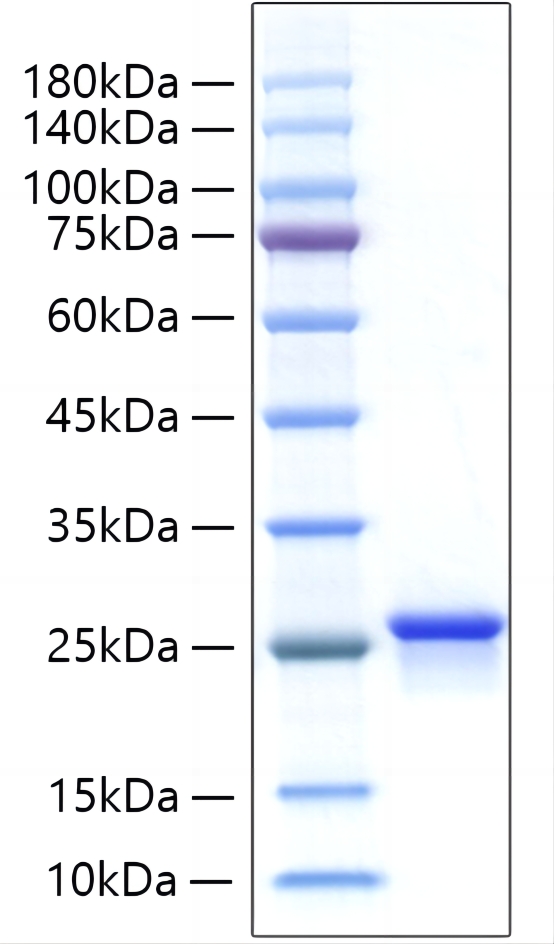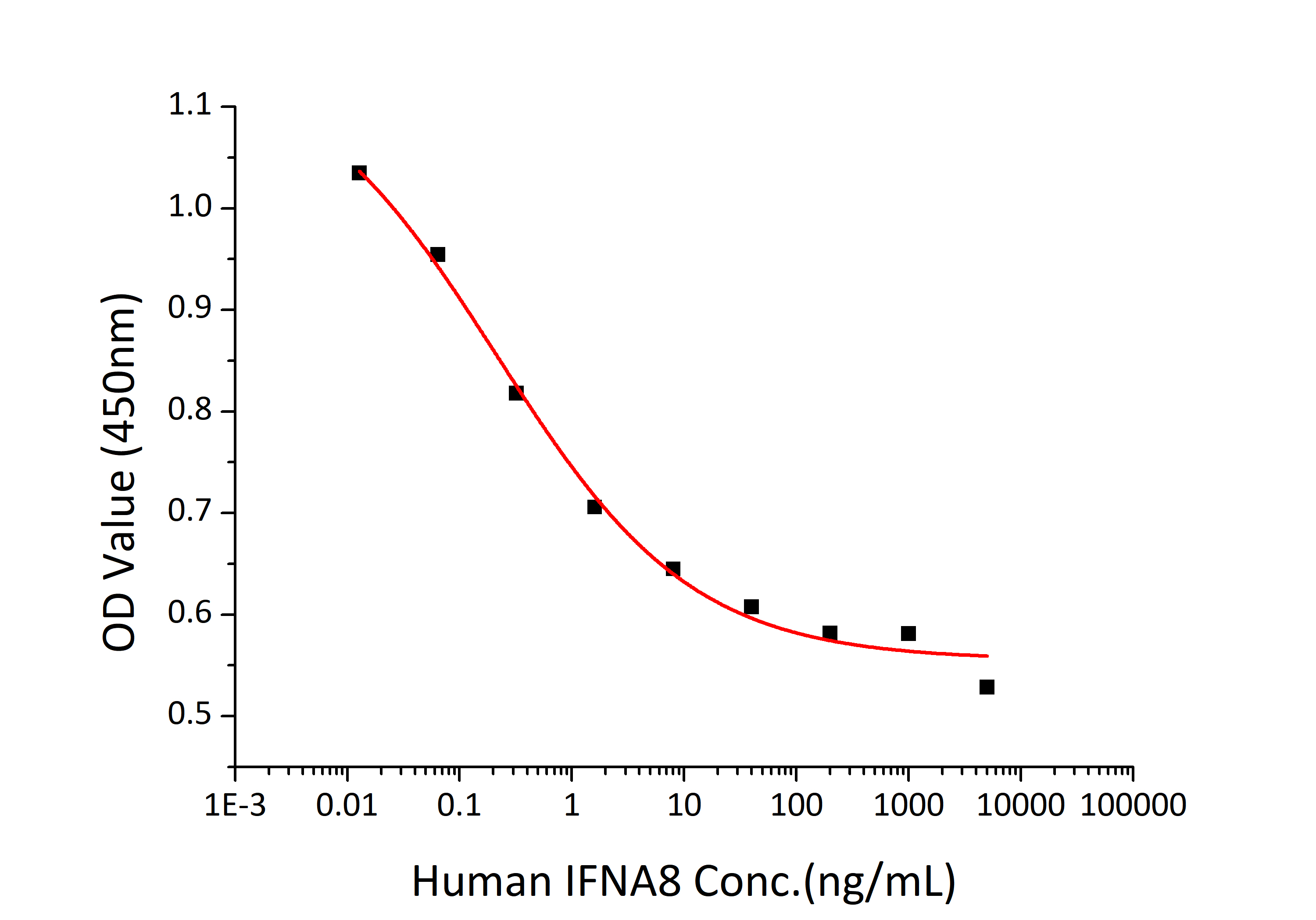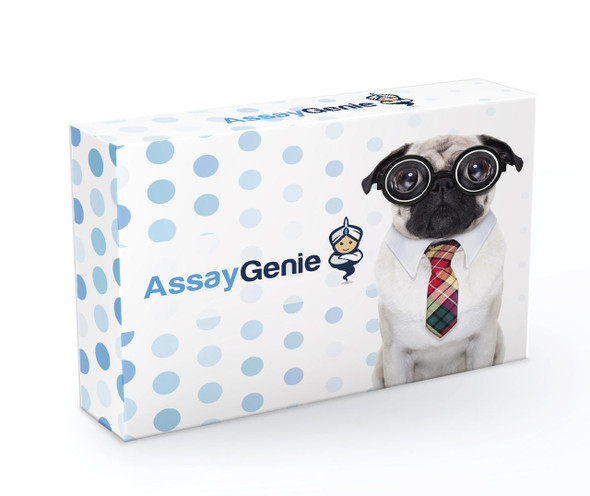Description
Recombinant Human IFN-alpha B2/IFNA8 Protein
The Recombinant Human IFN-alpha B2/IFNA8 Protein is a biologically active recombinant protein that plays a significant role in various cellular processes and signaling pathways in human biology. This protein is widely employed in immunological research, cell biology studies, protein-protein interaction analyses, and therapeutic development, providing researchers with a reliable tool for investigating IFN-alpha B2/IFNA8 function and its implications in health and disease.
This product (SKU: RPCB1908) is produced using HEK293 cells and features a C-His tag for convenient detection and purification. The protein exhibits a calculated molecular weight of 20.58 kDa with an observed molecular weight of 25-30 kDa under denaturing conditions, achieving ≥ 95 % as determined by SDS-PAGE.. Functional bioactivity has been validated through rigorous quality control assays, confirming its suitability for demanding research applications.
Key Features
| High Purity by Affinity Chromatography | |
| Mammalian & Bacterial Expression Systems | |
| High lot-to-lot consistency via strict QC |
| Product Name: | Recombinant Human IFN-alpha B2/IFNA8 Protein |
| SKU: | RPCB1908 |
| Size: | 10 μg , 20 μg , 50 μg , 100 μg |
| Reactivity: | Human |
| Synonyms: | IFNA8, IFN-alpha 8, IFNalpha B2, IFN-alpha B2, IFN-alpha-8, IFN-alphaB, interferon alpha type 201, interferon alpha-8, Interferon alpha-B, interferon alpha-B', Interferon alpha-B2, interferon, alpha 8, LeIF B |
| Tag: | C-His |
| Expression Host: | HEK293 cells |
| Calculated MW: | 20.58 kDa |
| Observed MW: | 25-30 kDa |
| Gene ID: | 3445 |
| Protein Description: | High quality, high purity and low endotoxin recombinant Recombinant Human IFN-alpha B2/IFNA8 Protein (RPCB1908), tested reactivity in HEK293 cells and has been validated in SDS-PAGE.100% guaranteed. |
| Endotoxin: | < 0.01 EU/μg of the protein by LAL method |
| Purity: | ≥ 95 % as determined by SDS-PAGE. |
| Formulation: | Lyophilized from a 0.22 μm filtered solution of PBS, pH 7.4. |
| Bio-Activity: | Measured in a cell cytotoxicity assay using TF-1 cells. The ED 50 for this effect is 0.10‑0.42 ng/mL, corresponding to a specific activity of 2.38×10 6 ~1.0×10 7 units/mg. |
| Reconstitution: | Centrifuge the vial before opening. Reconstitute to a concentration of 0.1-0.5 mg/mL in sterile distilled water. Avoid vortex or vigorously pipetting the protein. For long term storage, it is recommended to add a carrier protein or stablizer (e.g. 0.1% BSA, 5% HSA, 10% FBS or 5% Trehalose), and aliquot the reconstituted protein solution to minimize free-thaw cycles. |
| Storage: | Store at -20℃.Store the lyophilized protein at -20℃ to -80 ℃ up to 1 year from the date of receipt. After reconstitution, the protein solution is stable at -20℃ for 3 months, at 2-8℃ for up to 1 week. |
Interferon alpha-B, also known as IFNA8, belongs to the alpha/beta interferon family. Interferons are proteins made and released by host cells in response to the presence of pathogens such as viruses, bacteria, parasites, or tumor cells. Interferon stimulates the production of two enzymes: a protein kinase and an oligoadenylate synthetase. They also allow for communication between cells to trigger the protective defenses of the immune system that eradicate pathogens or tumors. Interferons also activate immune cells, such as natural killer cells and macrophages. They increase recognition of infection or tumor cells by up-regulating antigen presentation to T lymphocytes. They also increase the ability of uninfected host cells to resist new infections by virus. Certain symptoms, such as aching muscles and fever, are related to the production of IFNs during infection. Produced by macrophages, IFN-alpha has antiviral activities.








